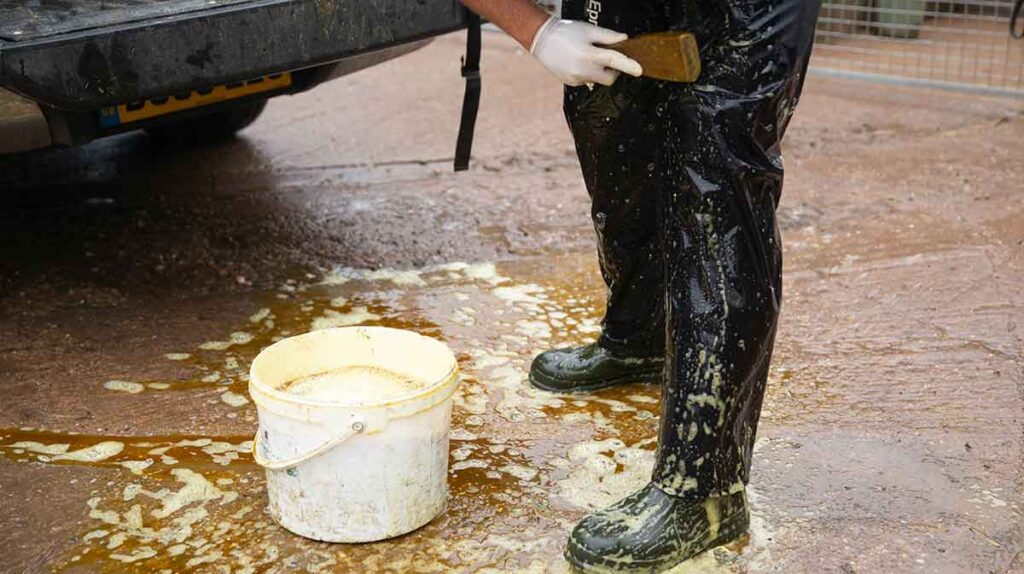Following a successful first African swine fever (ASF) simulation exercise in July, we held a second workshop to address some of the issues raised in mid-September.
The first exercise brought together industry and government to work through a hypothetical but very plausible scenario in which ASF arrives on a farm and subsequently spreads through a pyramid.
See also: Why funding for Dover could be a general election ‘quick win’ for the main parties
This time, we focused on processing and the onwards supply chain in an attempt to answer questions raised at the previous meeting and to identify further gaps.
With processors and retailers in attendance, NPA and AHDB were supported by Defra, the Animal and Plant Health Agency (APHA) and the Food Standards Agency (FSA), with the latter holding the remit for much of disease control in abattoir and further processing facilities.
More knowledge
As expected, it wasn’t possible to solve every problem in one day, but everyone went away with more knowledge of the risks and processes than when we started, as well as actions to help prepare their own businesses for an outbreak.
Chief among the learnings were details around the pre-designation of abattoirs, which would ease the path to them being designated as a site that could receive pigs from inside a disease control zone in the case of an outbreak.
After the past few years, everyone in the industry knows the risk posed by delays in processing, so the priority will be to get product moving as soon as possible.
Pre-designation can be applied for in peace time, and it entails providing the FSA and Defra with information that will allow them to quickly approve a site as designated in the event of a disease outbreak.
While pre-designation is not legislated, this process will make things quicker and easier for all, should ASF arrive.
Pre-designation and, in turn, designation will depend on factors including the ability to separate product lines and C&D facilities and protocols.
More information on a tiered system of pre-designation, which should be of value to smaller abattoirs, will be available shortly.
Another question asked at our first workshop was what would happen if a case was suspected and under investigation while pigs from the farm were already travelling to the abattoir.
APHA agreed that the best thing would be for the wagon to pull over and, once they had been contacted, return to the farm. The priority will be to keep abattoirs open and functioning, which would be jeopardised should those pigs enter it.
The NPA will be supporting the processors with training materials and helping all involved with the next steps to advance industry preparation as much as possible.
Border controls
We are also working hard on border controls. It was good to see the government recognise the risk of the virus being brought into the country by travellers with its new measures on personal imports.
But this is just a small part of a much bigger picture and we will continue to push for proper resource to help tackle the huge trade in illegal meat.
It was encouraging to see the issue of illegal meat being raised in the National Food Crime Unit’s strategic assessment, which sets out its priorities based on intelligence of food crime threats and ongoing investigations.
While the assessment doesn’t set out how this problem will be addressed, we at least can be reassured that it is being explored by this agency, as illegal meat poses not only a disease risk to animals, but also a significant food safety threat.
With a new government now in place, in July the Livestock Chain Advisory Group, made up of 26 UK livestock trade associations, including the NPA, wrote to new Defra secretary of state Steve Reed to raise these issues.
Sevington failings
Also concerning are reports from Dover that even legal, commercial imports of product of animal origin, which, since April 30, should have been directed to the border control post at Sevington, 22 miles inland from Dover, have not been subject to the checks required under the government’s border control policy.
We are hearing reports that the entire system was not ready in time and, more alarmingly, it is entirely unfit for purpose.
These messages have been communicated to Mr Reed and Baroness Hayman, who is responsible for this policy area, and we will continue to seek a meeting with them to discuss this further.
Border control must be taken seriously if ASF and other notifiable diseases are to be kept at bay. France, for example, is now considering building a fence along the border with Germany to keep wild boar out of the country.
One would think that being an island would allow us greater control of our own biosecurity, but unfortunately this is proving not to be the case.




